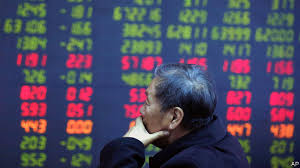China’s regulators try to engineer a stockmarket rally

CALLING THE bottom after share prices plunge is a crapshoot. Though investors parse trading charts, bond yields and commodity prices for clues, timing the market remains more a matter of luck than skill. But in China the signal is, at least in the short term, a lot clearer: just wait for the government to barge in. So it proved on October 19th, when four senior financial officials, including the central-bank governor, made a rare co-ordinated effort to talk up beleaguered stocks. By October 22nd, the next trading day, the market had soared by nearly 10%.
Though it later gave back some of those gains, the rally was a sharp break from the nearly relentless declines of recent months (see chart), which had made Chinese equities the world’s worst this year in local-currency terms. The market withstood Wall Street’s sharp drop on October 24th, ending the next day flat after an early swoon.
China’s stockmarket is often written off as an unimportant feature of its economic landscape. Companies get far more financing from bank loans than they do from issuing shares. Many top firms, notably China’s tech giants, are only listed abroad. The stockmarket’s performance has borne little relationship to that of the economy. But the intervention from China’s leaders shows that it is unwise to dismiss it too lightly.
One reason why they fret about the sell-off is simply that it looks bad. America’s president, Donald Trump, and his advisers point to it as proof that they are winning the trade war. Analysts have been quick to note that China’s own policies are the real source of the market’s woe: a campaign to control debt has drained liquidity. But Mr Trump’s claim is not entirely wrong. Pessimism about America’s tariffs has weighed heavily on sentiment. The more stocks sell off, the more serious the damage from the trade war seems to be, although it has barely begun. Breaking the feedback loop has become a priority for regulators.
They also have a more technical worry. Compared with state-owned firms, private companies struggle to obtain loans, because banks see them as riskier. So five years ago the government made it easier for listed firms to use their shares as collateral. That gave them a nice wad of cash while the market was in good shape. Moody’s, a rating agency, estimates that nearly a quarter of listed firms had more than 30% of their shares pledged for loans earlier this year.
But as the market tumbled, the value of this collateral shrank. That forced their lenders to sell pledged shares. In the ensuing market rout, deep-pocketed state companies have taken big stakes in at least 30 troubled private ones. A financing tool intended to help the private sector had, in other words, led to a small wave of nationalisations, and to disquiet about China’s business climate. Officials are now working to unwind the share pledges. They have, among other things, asked insurers to lend cash to hard-hit firms.
Optimists might say that China’s regulators have shown more restraint in shoring up the stockmarket than they did in 2015, after an even bigger crash. During that episode they allowed more than half of listed firms to suspend their shares from trading, trapping investors. They also directed a “national team” of state-owned banks and asset managers to buy more than $ 200bn in shares. This time, trading in just 2% of shares has been suspended; the national team has only nibbled on stocks.
But the bigger lesson, one that will hang over Chinese stocks for years to come, remains much the same: it is more valuable to scrutinise government actions than to bother with the market itself. A few days before officials banded together to rally the market, Liu Shiyu, the securities regulator, was quoted as saying that “springtime was not far off”. It is easy to forecast the weather when you also make it.
This article appeared in the Finance and economics section of the print edition under the headline “The weathermakers”





